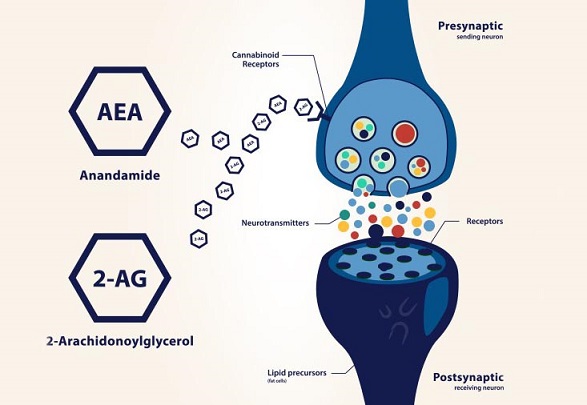Nikhil Prasad Fact checked by:Thailadn Medical News Team Aug 23, 2024 1 year, 4 months, 4 days, 22 hours, 41 minutes ago
Medical News: In a groundbreaking study conducted by researchers from Hospital Universitario Fundación Alcorcón-Spain and Universidad Francisco de Vitoria in Madrid-Spain, new light has been shed on the role of endocannabinoids (eCBs) in the body's inflammatory response to SARS-CoV-2, the virus responsible for COVID-19.

The study explores how these naturally occurring compounds in the body may influence the course of COVID-19, particularly during its acute and post-acute phases. This
Medical News report delves into the key findings and implications of this research, providing insights that could potentially shape future therapeutic approaches for COVID-19.
Understanding Endocannabinoids and Their Role in the Immune System
Endocannabinoids are bioactive lipids produced by various tissues in the body, including immune cells. They interact with two main receptors, cannabinoid receptor type 1 (CB1R) and type 2 (CB2R), to regulate a range of physiological processes, including immune responses. CB2R, in particular, is predominantly found in immune cells and plays a critical role in modulating inflammation. This study investigated the levels of two major eCBs - 2-arachidonoylglycerol (2-AG) and N-arachidonoylethanolamide (AEA) - in COVID-19 patients to understand their involvement in the inflammatory response triggered by the virus.
Key Findings: Elevated 2-AG Levels in COVID-19 Patients
The study analyzed plasma samples from 64 individuals, including healthy donors, acute COVID-19 patients, and post-acute patients who had recovered from the infection. The researchers found that levels of 2-AG were significantly elevated in COVID-19 patients compared to healthy individuals. The highest concentrations were observed in the acute phase of the disease, suggesting that 2-AG plays a significant role in the body's inflammatory response during active infection.
Moreover, the study revealed that 2-AG levels remained elevated even in the post-acute phase, up to 60 days after infection. This persistent elevation indicates that 2-AG might be involved in the lingering inflammation observed in some patients, a condition often referred to as "long COVID." The findings suggest that 2-AG could serve as a biomarker for ongoing inflammation and possibly the severity of the disease.
The Impact of Decreased AEA and PEA Levels
In contrast to 2-AG, the study found that levels of AEA and another eCB, N-palmitoylethanolamide (PEA), were significantly decreased in post-acute COVID-19 patients. AEA and PEA are known for their anti-inflammatory properties, and their reduction in post-acute patients may indicate a disruption in the body's ability to regulate inflammation after the acute phase of the infection.
Interestingly, the study found a negative correlation between the levels of AEA and PEA and the number of lymphocytes, a type of white blood cell crucial for the immune response. This correlation persisted in post-acute patients, further suggesting that these eCBs might play a role in the prolonged immune response seen in long COVID.
;
The Potential Role of Endocannabinoids as Therapeutic Targets
Given the observed alterations in eCB levels in COVID-19 patients, the researchers propose that the endocannabinoid system (ECS) could be a potential therapeutic target for managing COVID-19 and its long-term effects. Previous studies have shown that CB2R activation can reduce inflammation by decreasing the release of pro-inflammatory cytokines and promoting the release of anti-inflammatory cytokines. Therefore, targeting the ECS might help in controlling the excessive inflammation seen in severe COVID-19 cases.
However, the study also highlights the complexity of the ECS, as 2-AG has been shown to have both pro- and anti-inflammatory effects depending on the context. For instance, while 2-AG can alleviate inflammation in conditions like osteoarthritis, it can also enhance the release of IL-6, a pro-inflammatory cytokine, in other settings. This duality underscores the need for further research to fully understand how eCBs influence inflammation in COVID-19 and how they can be modulated for therapeutic benefit.
Limitations and Future Research
The study's findings are based on samples collected during the first wave of the COVID-19 pandemic, before the availability of vaccines or specific treatments. This context is important as the inflammatory response in these patients may differ from those in later stages of the pandemic, where vaccination and antiviral treatments have altered the disease course.
Additionally, the study faced limitations such as a small sample size and the inability to analyze gene expression or enzyme activity related to eCB synthesis and degradation. These limitations highlight the need for larger, more comprehensive studies to validate these findings and explore the potential of eCBs as biomarkers or therapeutic targets in COVID-19.
Conclusion
This study provides valuable insights into the role of endocannabinoids in the inflammatory response to SARS-CoV-2 infection. The significant elevation of 2-AG levels in both acute and post-acute COVID-19 patients suggests that this eCB could be a key player in the disease's inflammatory processes. Conversely, the decrease in AEA and PEA levels points to a potential disruption in the body's ability to resolve inflammation after the acute phase.
While these findings open new avenues for research and potential therapeutic interventions, further studies are needed to fully understand the complex role of the endocannabinoid system in COVID-19. This research underscores the importance of continued investigation into the molecular mechanisms underlying COVID-19 to improve clinical management and outcomes for patients.
The study findings were published in the peer-reviewed journal: Scientific Reports.
https://link.springer.com/article/10.1038/s41598-024-70172-5
For the latest
COVID-19 News, keep on logging to Thailand Medical News.
Read Also:
https://www.thailandmedical.news/news/study-shows-high-fat,-high-sugar-diet-modifies-the-microbiome-and-endocannabinoid-system
https://www.thailandmedical.news/news/brazilian-study-shows-that-cannabinoids-exhibit-anti-inflammatory-and-protective-effects-on-sars-cov-2-infected-hu
